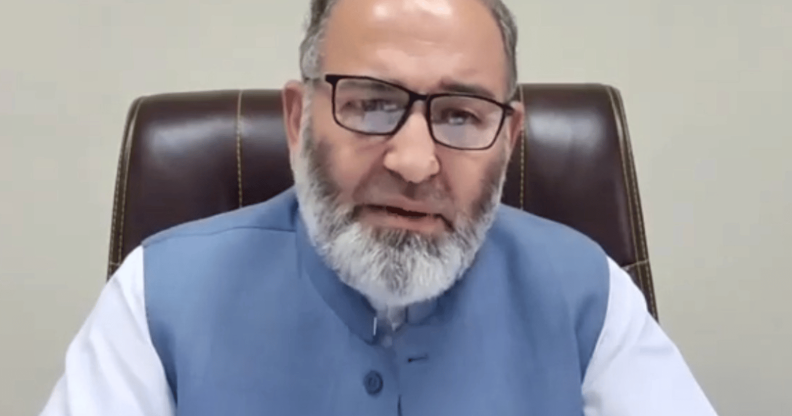Pakistan’s landmark trans rights law under attack as senator launches bid to roll back protections

Senator Mushtaq Ahmed speaks during a recording on the transgender protecting bill. (Jamaat-e-Islami/YouTube)
A Pakistani senator from a viciously anti-LGBTQ+ party has launched a legal bid to roll back trans rights law.
Senator Mushtaq Ahmed, of Jamaat-e-Islami (JI), Pakistan’s largest religious party, filed a petition to the Federal Shariat Court on 18 September claiming that the 2018 Transgender Rights Bill contradicts the Islamic principles of the country.
The bill was signed into law in May 2018 after years of political attempts to provide discrimination protections for transgender and non-binary people.
It allows transgender people in the country to obtain various ID documents, including a diving license and a passport, from the National Database and Registration Authority (NADRA), and allows for gender markers on existing documents to be updated.
There are also a number of discrimination protections that: allow transgender citizens to access educational and medical facilities, establish safe spaces for gender-diverse individuals, protect incarcerated transgender people, and more.
According to Pakistani newspaper Minute Mirror, right-wing critics have also claimed the bill “promote homosexuality and gay marriages”. This has been labelled “false propaganda”.
In his petition, the senator claimed that the bill causes complications when it comes to Islamic heredity as it allows for an individual to change their gender identity.
According to Islamic jurisdiction, women receive half the inheritance share of men if they inherit from the same parent. Ahmed claimed that, because transgender people can “change gender at will,” it nullifies the heredity clause and is “repugnant to Islamic injunctions”.
Ahmed suggested to acting chief justice Syed Muhammad Anwar that in order for a person to be able to change their gender marker, they should first be required to undergo a medical test, though there was no clarification as to what this test would entail.
His political party, Jamaat-e-Islami, is incredibly anti-LGBTQ+ and has said multiple times that homosexuality is a “threat to society.”
“The social balance of society gets upset because of this trend [of homosexuality]. Man and women have some well-defined roles in a society and family. Same-sex unions violate these rules,” the party said in a 2013 statement. “Legalising homosexual unions today would open the floodgates for euthanasia, incest, and whatnot.”
Trans activists urge court to protect trans people
Testifying in court, trans activist Bubbly Malik argued that, if the bill were to be reviewed, there would need to be assistance from “gender experts” who could clarify why it was so important to maintain protections for the marginalised community.
Speaking at the hearing, transgender human rights activist Nayab Ali said the threat to the community “has multiplied” over the past few years, adding that “the court should issue an order restraining from any action against any transgender [person] until [the] decision of the case.”
According to activist Farzana Riaz, in an April 2022 interview with The Guardian, at least 91 transgender women in Pakistan have been killed since 2015. Additionally, there were at least 2,000 reported cases of violence against the transgender community in the Pakistani region of Khyber Pakhtunkhwa alone.
Trans-Action president Farzana Ilyas has criticised the Pakistani government for its failure to protect the population, adding that “in the last four or five years, 1500 transgender individuals have been raped.”
While the Transgender Rights Bill has attempted to mitigate the growing issue of violence against transgender individuals, its effectiveness has been questioned on multiple occasions.
Despite a major part of the law detailing educational equality, a study published in 2019 found that nearly 40 per cent of transgender people in the country are illiterate.
After the bill was signed into law, Pakistan LGBTQ+ activist Mehlab Jameel told NPR: “I was in a state of shock because I never thought something like this could happen within my own life in Pakistan.”

